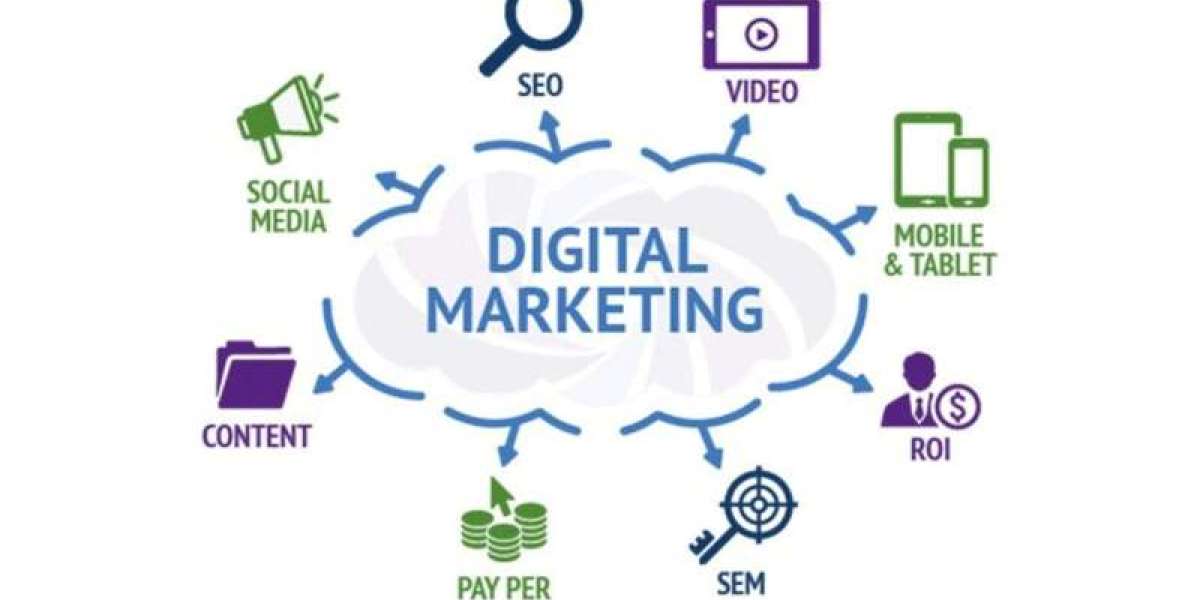Table of Contents
Introduction
1.1 The Rise of Artificial Intelligence in Marketing
1.2 The Importance of Predictive Marketing in Today’s Business World
1.3 How Digital Marketing Courses are Integrating AI Concepts
Understanding Artificial Intelligence in Marketing
2.1 Defining Artificial Intelligence (AI)
2.2 Types of AI Used in Marketing
2.3 Key AI Technologies Driving Predictive MarketingWhat is Predictive Marketing?
3.1 Definition and Key Concepts of Predictive Marketing
3.2 How Predictive Marketing Helps Businesses
3.3 The Role of Data in Predictive MarketingHow AI Enhances Predictive Marketing
4.1 AI’s Role in Data Collection and Analysis
4.2 Machine Learning and its Impact on Predictive Marketing
4.3 AI Algorithms and Predictive Analytics
4.4 Real-Time Decision Making with AI in Predictive MarketingBenefits of AI in Predictive Marketing
5.1 Improved Customer Targeting and Personalization
5.2 Enhanced Customer Engagement
5.3 Better Resource Allocation
5.4 Increased Conversion Rates
5.5 Cost EfficiencyChallenges of Implementing AI in Predictive Marketing
6.1 Data Quality and Integrity Issues
6.2 Ethical Concerns with AI Marketing
6.3 Over-Reliance on Automation
6.4 Integration and Scalability ChallengesThe Role of Digital Marketing Courses in Adapting to AI Trends
7.1 How Digital Marketing Courses Prepare Professionals for AI Integration
7.2 The Importance of Learning AI Tools and Techniques in a Digital Marketing Course
7.3 Benefits of Enrolling in a Digital Marketing Course in PakistanPredictive Marketing Success Stories: AI in Action
8.1 Case Studies of AI-Powered Predictive Marketing Campaigns
8.2 Success Stories from Leading Brands
8.3 Measuring the ROI of AI in Predictive MarketingFuture Trends in AI and Predictive Marketing
9.1 The Evolution of AI Technologies in Marketing
9.2 Predictive Marketing in the Next Decade
9.3 How AI Will Shape the Future of Digital MarketingConclusion
10.1 Key Takeaways from the Role of AI in Predictive Marketing
10.2 The Need for Digital Marketing Professionals to Stay Updated on AI
1. Introduction
1.1 The Rise of Artificial Intelligence in Marketing
Artificial Intelligence (AI) has made significant strides in the marketing world, revolutionizing the way businesses engage with their customers and analyze data. The integration of AI into predictive marketing strategies has enabled businesses to move beyond traditional methods, using sophisticated algorithms to predict consumer behavior and personalize experiences. As AI becomes a core element of marketing strategies, there is a growing demand for professionals who can leverage these technologies effectively. This is where Digital Marketing Courses play an essential role in shaping future marketers.
In countries like Pakistan, AI-driven marketing has seen substantial growth, and professionals are increasingly looking to enhance their skills. A Digital Marketing Course in Pakistan now incorporates AI-focused modules to equip students with the necessary tools and strategies to thrive in the evolving marketing landscape.
1.2 The Importance of Predictive Marketing in Today’s Business World
Predictive marketing refers to the use of data, machine learning algorithms, and AI technologies to forecast future customer behaviors and outcomes. This enables businesses to create highly targeted and personalized marketing campaigns that maximize engagement and conversion rates. Predictive marketing has become an essential tool for businesses looking to stay competitive in the digital age. AI and machine learning techniques are increasingly being employed to improve marketing efficiency, offering a more tailored approach to each customer.
With the growing reliance on AI, learning about predictive marketing in-depth is critical. That’s why professionals seeking to excel in the digital marketing space can benefit from enrolling in a Digital Marketing Course that teaches AI-driven marketing techniques.
1.3 How Digital Marketing Courses are Integrating AI Concepts
As AI continues to play a larger role in digital marketing, leading educational institutions have started integrating AI concepts into their Digital Marketing Course curriculums. Students are introduced to various AI technologies, including natural language processing (NLP), predictive analytics, and machine learning, which are all essential for developing effective marketing strategies. Additionally, these courses explore how AI can be used to optimize customer targeting, personalization, and campaign performance.
For those in Pakistan, enrolling in a Digital Marketing Course in Pakistan provides an opportunity to understand the practical application of AI tools in predictive marketing and gain a competitive edge in the job market.
2. Understanding Artificial Intelligence in Marketing
2.1 Defining Artificial Intelligence (AI)
Artificial Intelligence is a branch of computer science that focuses on creating systems capable of performing tasks that would typically require human intelligence. These tasks include learning from data, recognizing patterns, making decisions, and solving problems. In marketing, AI is used to automate processes, analyze large datasets, and generate insights that would be difficult or time-consuming for human marketers to achieve manually.
2.2 Types of AI Used in Marketing
Several types of AI technologies are commonly used in marketing, including:
Machine Learning (ML): Algorithms that allow machines to learn from data and improve over time without explicit programming.
Natural Language Processing (NLP): Technology that allows machines to understand, interpret, and generate human language.
Chatbots and Virtual Assistants: AI-powered tools that engage with customers in real-time through automated messaging.
Predictive Analytics: Using data models to forecast future customer behaviors based on past data.
2.3 Key AI Technologies Driving Predictive Marketing
The following AI technologies are central to predictive marketing:
Data Mining: AI can analyze vast amounts of data to uncover patterns and trends that inform predictive models.
Machine Learning Algorithms: These algorithms allow predictive models to adjust and improve over time as more data is collected.
Customer Segmentation: AI can help segment customers based on their behavior, helping businesses tailor campaigns to specific groups.
Automated Content Creation: AI can generate personalized content for marketing campaigns based on customer profiles and behavior.
3. What is Predictive Marketing?
3.1 Definition and Key Concepts of Predictive Marketing
Predictive marketing uses historical data, AI, and machine learning to predict customer behavior and improve marketing efforts. By analyzing past interactions and customer data, businesses can forecast future actions and personalize their marketing strategies. The goal of predictive marketing is to reach the right customer with the right message at the right time, increasing the chances of conversion.
3.2 How Predictive Marketing Helps Businesses
Predictive marketing helps businesses by:
Enhancing Customer Targeting: It enables marketers to identify the most likely prospects for conversion.
Personalizing Content: Predictive marketing helps create highly relevant content for specific customer segments.
Optimizing Marketing Campaigns: It allows businesses to fine-tune their strategies based on predictions about what will work best.
3.3 The Role of Data in Predictive Marketing
Data is the foundation of predictive marketing. The more data a business can gather, the more accurate its predictions will be. This includes customer behavior data, purchase history, social media activity, and browsing habits. AI analyzes this data to generate insights that help businesses make informed decisions.
4. How AI Enhances Predictive Marketing
4.1 AI’s Role in Data Collection and Analysis
AI plays a crucial role in collecting and analyzing large amounts of data. Traditional methods of data analysis are time-consuming and limited in scope, but AI can process vast datasets quickly and efficiently, providing businesses with valuable insights. By understanding trends, patterns, and customer preferences, businesses can make better-informed marketing decisions.
4.2 Machine Learning and its Impact on Predictive Marketing
Machine learning algorithms are essential for predictive marketing. They enable businesses to continuously improve their predictions by learning from new data. As more data is collected, these algorithms become more accurate at forecasting customer behavior, leading to better-targeted marketing strategies.
4.3 AI Algorithms and Predictive Analytics
AI algorithms, such as regression analysis and classification models, are used in predictive analytics to forecast future events based on historical data. These algorithms help marketers predict which customers are most likely to engage with a particular offer, improving conversion rates.
4.4 Real-Time Decision Making with AI in Predictive Marketing
AI allows marketers to make real-time decisions based on the latest data. For example, if a consumer shows interest in a product, AI can trigger an automated email or an ad in real-time, tailored to the consumer’s preferences. This instant decision-making helps businesses capitalize on opportunities immediately.
5. Benefits of AI in Predictive Marketing
5.1 Improved Customer Targeting and Personalization
AI-driven predictive marketing allows businesses to target the right customers with personalized content and offers. By analyzing customer data, AI can predict which products a customer is most likely to purchase, allowing businesses to tailor their messages accordingly.
5.2 Enhanced Customer Engagement
Predictive marketing powered by AI helps businesses engage with customers more effectively by sending personalized content at the right time. This increases the likelihood of customer interaction and loyalty.
5.3 Better Resource Allocation
AI allows businesses to allocate marketing resources more efficiently by focusing on high-potential customers. Predictive analytics ensures that marketing efforts are directed at the most promising prospects, maximizing return on investment (ROI).
5.4 Increased Conversion Rates
By targeting the right customers with personalized messages and offers, businesses can increase their conversion rates. Predictive marketing enables marketers to understand which factors drive conversions and optimize their campaigns for better results.
5.5 Cost Efficiency
AI in predictive marketing helps businesses save money by automating processes, reducing the need for manual labor, and eliminating guesswork. By focusing on high-potential customers, businesses can avoid wasting resources on ineffective campaigns.
6. Challenges of Implementing AI in Predictive Marketing
6.1 Data Quality and Integrity Issues
The effectiveness of AI in predictive marketing relies heavily on the quality of data. Poor-quality data can lead to inaccurate predictions and misguided marketing efforts
. Ensuring that data is clean, accurate, and up-to-date is crucial for the success of AI-driven marketing strategies.
6.2 Ethical Concerns with AI Marketing
There are ethical concerns surrounding AI in marketing, particularly regarding privacy and data security. Marketers must ensure that they are transparent about how customer data is being used and comply with relevant regulations to maintain consumer trust.
6.3 Over-Reliance on Automation
While AI can automate many aspects of marketing, it is important not to over-rely on automation. Human judgment is still needed for strategic decisions, and AI should be used to complement, not replace, human input.
6.4 Integration and Scalability Challenges
Integrating AI technologies into existing marketing systems can be challenging. Businesses need to ensure that their infrastructure can support AI-powered tools and scale them effectively as their marketing efforts grow.
7. The Role of Digital Marketing Courses in Adapting to AI Trends
7.1 How Digital Marketing Courses Prepare Professionals for AI Integration
Digital marketing courses are essential for professionals looking to adapt to the rise of AI in marketing. These courses teach the necessary skills to implement AI-driven strategies, from using machine learning tools to analyzing predictive data. A Digital Marketing Course in Pakistan can help individuals stay ahead of industry trends by providing hands-on experience with AI technologies.
7.2 The Importance of Learning AI Tools and Techniques in a Digital Marketing Course
Digital marketing courses now include AI modules, where students learn how to use AI tools for customer segmentation, personalization, and predictive analytics. These skills are increasingly in demand as businesses look for professionals who can harness the power of AI.
7.3 Benefits of Enrolling in a Digital Marketing Course in Pakistan
A Digital Marketing Course in Pakistan not only covers traditional marketing strategies but also emphasizes the role of AI in marketing. With the increasing demand for AI-driven marketing solutions, enrolling in a course that focuses on these technologies will enhance career prospects and open up new opportunities.
8. Predictive Marketing Success Stories: AI in Action
8.1 Case Studies of AI-Powered Predictive Marketing Campaigns
Several companies have successfully integrated AI into their predictive marketing campaigns. For instance, Netflix uses AI to recommend movies and TV shows based on user behavior, significantly improving engagement and retention. Similarly, Amazon uses AI-driven predictive marketing to personalize product recommendations.
8.2 Success Stories from Leading Brands
Brands like Coca-Cola, Nike, and Starbucks have also embraced AI for predictive marketing, leveraging customer data to create personalized experiences that increase customer loyalty and drive sales.
8.3 Measuring the ROI of AI in Predictive Marketing
By using AI-driven analytics, businesses can measure the return on investment (ROI) of their predictive marketing campaigns. This allows them to optimize future strategies and maximize profitability.
9. Future Trends in AI and Predictive Marketing
9.1 The Evolution of AI Technologies in Marketing
AI technologies are rapidly evolving, and predictive marketing is becoming more sophisticated. Future trends include enhanced machine learning algorithms, more accurate predictive models, and better real-time personalization.
9.2 Predictive Marketing in the Next Decade
In the next decade, predictive marketing powered by AI will become more integral to businesses. AI will be used to automate more processes, from content creation to customer interaction, improving efficiency and personalization.
9.3 How AI Will Shape the Future of Digital Marketing
AI will continue to shape the future of digital marketing by enabling businesses to create hyper-personalized experiences for their customers. As AI technology improves, marketing efforts will become more automated, data-driven, and customer-centric.
Conclusion
10.1 Key Takeaways from the Role of AI in Predictive Marketing
AI is revolutionizing the marketing landscape, and predictive marketing is at the forefront of this transformation. With AI tools, businesses can create personalized, data-driven marketing campaigns that improve customer engagement and increase conversion rates.
10.2 The Need for Digital Marketing Professionals to Stay Updated on AI
As AI continues to play a significant role in marketing, it is essential for digital marketing professionals to stay updated on the latest trends and technologies. Enrolling in a Digital Marketing Course that incorporates AI modules is a great way to remain competitive in this fast-evolving industry. By gaining expertise in AI-driven marketing strategies, professionals can unlock new opportunities and ensure long-term success.






